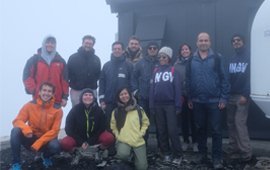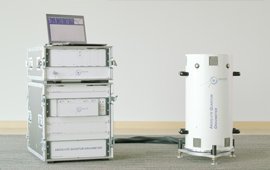Developing a new generation of portable, inexpensive gravimeters for real-time monitoring of subsurface mass changes: this is the goal of the researchers involved in the EU-funded project NEWTON-g, including Eleonora Rivalta and Mehdi Nikkhoo from GFZ section Physics of Earthquakes and Volcanoes. The gravity sensors will be based on microelectromechanical systems (MEMS).
The MEMS gravimeters are intended to detect relative differences in gravity, which indicate differences in density or mass movements in the subsurface. The newly developed instruments will be installed on Mt. Etna, in Sicily, anchored to a quantum gravimeter of the latest generation, a device that measures the absolute value of gravity on the spot, and three superconducting gravimeters. Many of these instruments will be co-located with sensors from the permanent monitoring network of the Italian volcano.
The instruments will look into the subsurface of Mt. Etna in an unprecedented resolution and help the project members to reach their second goal, which is laying down the theoretical bases of volcano gravimetry through numerical modeling of mass transfer and phase changes in the magmatic system.
The project was launched in June this year but it will take two years until the first sensors are installed, as the first two years of the project will be dedicated to developing field-compatible instruments. (jz)
NEWTON-g is funded by the EU within an initiative to promote “Future Emerging Technologies” (FET)









![[Translate to English:] Torsten Sachs in front of a climate station on a field](/fileadmin/_processed_/3/9/csm__TorstenSachs_bearbeitet_GS_4a1365ef84.jpeg)

![[Translate to English:] left image flood at the Ahrtal: image from above, several houses are flooded; left image:: Heidi Kreibich;](/fileadmin/_processed_/4/4/csm_Bild2_9af0130e9f.png)



![[Translate to English:] Start der Vega Rakete](/fileadmin/_processed_/6/4/csm_20231201-kachel_Vega-VV23-launch_ESA-CNES-Arianespace_706716b68c.jpeg)









![[Translate to English:] Poster exhibition at the Brandenburg Hydrogen Day at the GFZ, some participants in the foreground](/fileadmin/_processed_/6/5/csm_Erster_Brandenburgischer_Wasserstofftag_GFZ_402fcec95e.jpeg)
![[Translate to English:] Group picture of the participants](/fileadmin/_processed_/9/4/csm_20231108_CAWa-Workshop-Tashkent_Gruppenbild_99ea779d8a.jpeg)

![[Translate to English:] [Translate to English:] Hörsaal](/fileadmin/_processed_/e/6/csm_H%C3%B6rsal_e21ac645fb.jpeg)


![[Translate to English:] The Delegations in the Historic Library on the Telegrafenberg. In the back there are from left to right, the Dutch Ambassador for Germany, Ronald van Roeden, the Dutch Minister for Education, Culture and Science, Robbert Dijkgraaf and the scientific director of the GFZ, Susanne Buiter.](/fileadmin/_processed_/d/b/csm_Kachel-2_9eba4b4212.jpeg)

